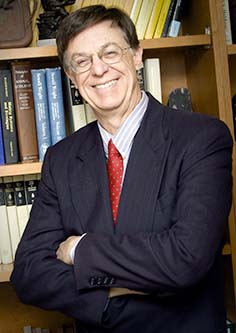Michael J. Wade
Distinguished Professor (Emeritus) - 2008

A prolific researcher, Wade has published more than 130 research papers that are widely referenced by other researchers; his total citations are approaching 5,000. A single paper he published in 1984 reporting groundbreaking theoretical work on measuring natural and sexual selection has been cited more than 540 times. Wade was recently honored by the National Science Foundation with an OPUS (Opportunities for Promoting Understanding through Synthesis) Award, which provides support for him to compile the body of his seminal work into a book. He has made major contributions to a number of critical areas in his field. One that brought him fame among philosophers as well as biologists is work regarding levels of selection. For 50 years, scientists have engaged in an intense debate about whether the process of natural selection operates at the level of genes, individuals, or groups.
Wade was well positioned to contribute to this debate, having earned his undergraduate degree with a double major in mathematics and biology from Boston College and his doctoral degree in the Department of Theoretical Biology from the University of Chicago, supported by an NIH training grant. According to his colleagues Ellen Ketterson and Curtis M. Lively, he had the mathematical talent to understand and extend the theory as well as the "courage, will, and empirical savvy to conduct heroic experiments." Ketterson and Lively declare that "through his daring approach to a controversial topic, Professor Wade established the empirical basis for this tension between group and individual selection. He then followed this study with rigorous theoretical treatments, which formalized the topic mathematically." His studies form much of the conceptual landscape for the discussion of levels of selection today. Wade has had an important role in developing the hugely influential Chicago School Theory of Evolutionary Genetics, helping extend the basic statistical framework used by plant and animal breeders (quantitative genetics) into a major evolutionary theory. This theory launched hundreds of dissertations and the careers of many prominent evolutionary biologists. In addition, he has made major advances in the field of mating-system evolution, which addresses topics such as the role of polygyny vs. monogamy on the evolution of differences between the sexes.
In a 2003 book on this topic, Mating Systems and Mating Strategies, Wade and Professor Stephen Shuster presented a new theory on sexual selection that has been widely cited. Wade has been a leader in another of biology's great debates regarding natural selection, undertaking theoretical and empirical studies that have profoundly influenced the field. "Wade has successfully incorporated in his formal models the idea that genes do NOT act independently," says Martha McClintock, the David Lee Shilling law Distinguished Professor in Psychology at the University of Chicago. "He has, in my view, revolutionized evolutionary models by bringing them in line with what we know has to be true about genes in real organisms."
He is also a distinguished teacher. Former biology department chair Elizabeth Raff says, "As well as being a path-breaking researcher and thinker, and a superb mentor for research students at all levels, Mike is also one of our most distinguished classroom teachers." He has regularly taught large sections of the required introductory course for biology majors, Evolution and Diversity, receiving enthusiastic student evaluations, as well as the Trustees' Teaching Excellence Award in 1999. He is director of the Evolution, Ecology, and Behavior Program, and serves as associate dean of faculties for the Bloomington campus. Throughout his career, his research has been funded with numerous grants from the National Science Foundation, the National Institutes of Health, and the Howard Hughes Medical Institute. In 2007 he was elected a member of the American Association for the Advancement of Science. In summing up Wade's research, Raff says his work "has bridged from theory to nature to the laboratory - and then, back again to re-examine each level in light of the other, to re-shape the theory, and to seek deeper answers in nature and in the lab. Mike is a true leader at all of these levels."
Wade received the IU Bicentennial Medal in September 2020 in recognition of his distinguished contributions to Indiana University.

